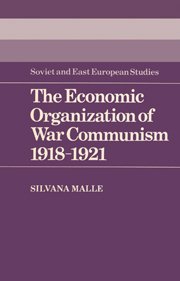Book contents
Summary
MILITARY EMERGENCY AND SMYCHKA
At the beginning of September Trotskii urged concentration of supply policy and pooling of national resources in the service of defence. Following his declaration that the Soviet Republic should become a war fortress, the Central Executive Committee prescribed a military regime of food procurement corresponding to the country's situation. At the end of 1918 the territory under Soviet rule was one-eleventh of that covered by the Brest–Litovsk Treaty. This loss included Siberia, which according to Narkomprod's plans was to compensate for the loss of the Ukraine as a source of grain provisions.
At the beginning of 1919 the army's monthly consumption of cereals was calculated at 6.5 million puds. The collected surplus in the grain-producing provinces which throughout war communism were to remain under Soviet rule had been only 24,488,000 puds of cereals in the food campaign of 1917–18. War added new impetus to centralization and provided the official justification for increasing and intensifying control measures.
Military emergency was to sublimate the drive to requisition foodstuffs, adding patriotic overtones to the struggle for the survival of the revolutionary government. The Bolshevik leadership understood that foreign intervention could give its power the legitimation that its own policy had been unable to secure. The tasks of defence were assigned to the Council of Workers' and Peasants' Defence, with the purpose of stressing the unity of the labouring people against the enemy and the formal halt to discrimination between the rural poor and other sections of the peasantry.
- Type
- Chapter
- Information
- The Economic Organization of War Communism 1918–1921 , pp. 396 - 465Publisher: Cambridge University PressPrint publication year: 1985

